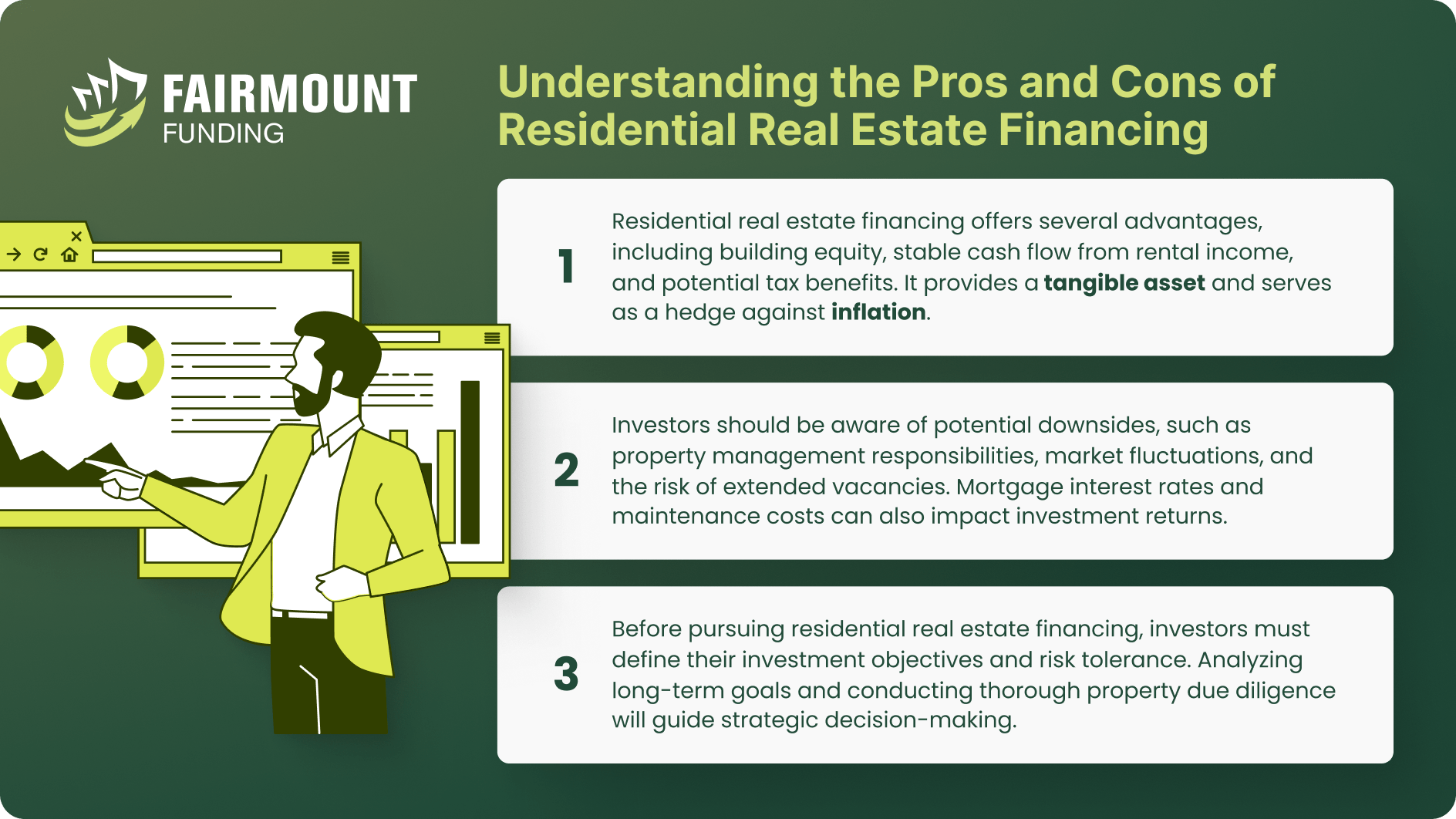
Real estate investing can pave the way for substantial financial gains. It can act as a safeguard against market volatility during stock market downturns, and it offers various perks tied to property ownership.
Whether your strategy involves acquiring and holding land for future development, engaging in property flipping, establishing a passive income stream through renting, or just getting another property with the anticipation of benefiting from its appreciation, investing in real estate provides a means to diversify your portfolio.
Funding is important for this type of investment and choosing your real estate financing can influence the outcome of your investment. Unlike stock market investments that often require minimal capital, real estate typically entails a higher initial investment cost. So before approaching a lender, it is necessary to understand the requirements of each type of real estate financing and how the various choices work.
What is residential real estate financing?
Real estate financing refers to the approach utilized by investors to obtain funds for an upcoming property transaction. It could be residential homes, office buildings, or land parcels. This method involves securing capital from an external source to facilitate the acquisition, development, construction, and operation of both commercial and residential properties. While similar to conventional financing, real estate finance involves specific terms and underwriting processes that necessitate thorough comprehension prior to entering into any contractual agreements.
As an investor, there are several approaches to consider when it comes to financing in real estate investments. Different types of real estate financing present their own advantages and disadvantages, and your financing strategy will be contingent upon the specific property and circumstances involved. Remember, what may work for one individual might not necessarily be suitable for your situation.
The key lies in discerning which real estate financing option aligns with your business strategy. By dedicating time to researching the diverse range of real estate financing options available, new investors will discover how accessible investing can truly be.
Commercial vs. Residential Real Estate
Understanding the difference between commercial vs. residential real estate is essential when navigating real estate finance and investments. While both categories offer lucrative investment prospects, they come with their own distinct challenges and advantages.
Commercial real estate, as the name suggests, are properties intended for business purposes. This includes office buildings, retail spaces, warehouses, industrial buildings, and commercially-zoned land. These properties are typically owned by businesses, real estate agents, investors, or developers who lease or rent them to tenants.
Commercial real estate properties are often more expensive than residential ones and need a substantial upfront investment. They are subject to stringent zoning regulations and must often meet specific safety and accessibility standards. Furthermore, commercial properties may be subjected to higher property taxes due to their revenue-generating potential.
On the other hand, residential real estate are properties designed for living purposes. This includes single-family homes, apartments, condos, and townhouses. Residential properties are typically owned by individuals or families who either reside in the property or rent it out to tenants.
Financing residential real estate generally carries a lower price tag compared to commercial properties, making them more accessible to individual investors. However, the decision to own a home or rent is contingent upon an individual’s financial situation and available real estate financing. Residential properties may also be subject to lower property taxes and tend to have fewer regulatory requirements to adhere to.
5 Reasons to Invest in Residential Real Estate
There are abundant benefits associated with residential real estate investment. By carefully selecting the right properties, investors can benefit from reliable cash flow, attractive returns, tax advantages, opportunity to diversify their portfolio, leverage assets, and build long-term wealth.
1. Cash Flow
One of the significant advantages of this investment strategy is its capability to generate consistent cash flow that improves over time. As time progresses and you gradually pay off the mortgage, the outstanding loan balance decreases which can lead to higher cash flow as the gap between rental income and expenses widens.
Moreover, a property with positive cash flow has the potential to weather market fluctuations, providing a level of stability and real estate finance security.
2. Tax Breaks
Real estate investors can capitalize on a multitude of tax benefits and deductions, resulting in potential savings during tax season. These incentives extend to various aspects of property ownership, operation, and management. One advantageous deduction is the ability to deduct reasonable expenses associated with owning and maintaining a property. For example, when you obtain multifamily rehab loans for the rehabilitation of a multi-family property, you can deduct the costs incurred in improving the property.
Furthermore, investors might benefit from a tax break known as a 1031 exchange. This clause enables investors to postpone capital gains taxes by trading one investment property for another of equivalent value. Investors can defer their tax liability and potentially magnify their gains by using a 1031 exchange to acquire a more valuable or better-performing property.
3. Equity Building
As you gradually repay the mortgage on a property, you simultaneously accumulate equity. This represents an essential asset contributing to your overall net worth and increasing your ownership stake in the property. As the equity grows, it unlocks a range of possibilities for further real estate finance and investments.
4. Portfolio Diversification
Investors can potentially attain a more balanced and resilient portfolio by integrating real estate with other asset classes such as stocks and bonds. During market instability, the distinctive characteristics and performance dynamics of real estate can assist balance the fluctuations experienced by other asset classes. This diversification impact is caused by the fact that real estate values react differently to different economic factors and market situations.
5. Competitive Risk-Adjustment Returns
Returns on real estate investments are affected by location, type of residential property, market conditions, and management. However, real estate investments have the potential to generate attractive returns while maintaining a comparable level of risk or even lower levels of risk in certain cases. This means that investors can potentially enjoy favorable risk-adjusted returns by including real estate as a component of their investment strategy.
Pros and Cons of Residential Real Estate Financing
Throughout history, real estate has consistently proven to be a powerful wealth-building tool. The numerous advantages associated with real estate investing contribute to its enduring appeal and potential for long-term financial growth.
Advantages of Residential Real Estate Financing
- Accessible Financing Options: Financing residential real estate is typically easier to get than commercial financing. There are numerous financing programs designed specifically for residential properties such as bridge loans, multifamily rehab loans, and more.
- Potential for Homeownership: Real estate financing allows individuals and families to fulfill the dream of homeownership. Buyers can spread the cost of the home for a number of years by getting a mortgage, making it more affordable and in line with their budget.
- Tax Benefits: Financing in real estate often comes with tax advantages. Mortgage interest, property taxes, and certain home-related expenses, may be eligible for deductions reducing the overall tax burden.
Disadvantages of Residential Real Estate Financing
- Qualification Criteria: All types of real estate financing requires meeting specific qualification criteria, including creditworthiness, income stability, and debt-to-income ratio. Those with weak credit history or low income may find it difficult to get real estate financing due to its strict lending rules.
- Down Payment and Closing Costs: Real estate finance for residential properties typically involves a substantial down payment and additional closing costs. This could be a significant barrier for some prospective buyers.
- Mortgage Commitment: Borrowers commit to making regular mortgage payments over an extended period, typically 15 to 30 years which can limit financial flexibility and restrict other investment opportunities.
Residential Real Estate Financing FAQs
What kind of properties are eligible for residential real estate financing?
Residential real estate financing is typically available for properties that are intended for personal use or as primary residences. This includes single-family homes, multi-family homes (duplexes, triplexes, quadplexes, or apartment buildings), condominiums, townhouses, and manufactured or mobile homes.
What are the available residential real estate financing options?
There are several real estate finance available for residential properties. Residential loan options include conventional mortgages, multifamily rehab loans, bridge loans, new construction loans, and other private lending options.
What real estate financing should I choose?
The most suitable real estate financing option will depend on a combination of your financial situation, investment strategy, property type, risk tolerance, and long-term plans. Taking the time to research and seek professional advice will help you make an informed decision that best suits your needs.
Maximize Your Wealth with Residential Real Estate Financing
Residential real estate finance allows for the accumulation of wealth through consistent cash flow, tax advantages, and future appreciation. However, it is critical to weigh the advantages and downsides, distinguish between commercial and residential real estate, and select the best financing option for your needs. You can successfully navigate the world of residential real estate financing and improve your real estate investments by studying the many elements and obtaining professional help.
KEY TAKEAWAYS
- Understanding real estate financing options and requirements maximizes investment outcomes.
- Residential real estate financing presents opportunities for wealth building.
- Residential real estate has more access to different types of financing options and fewer regulatory requirements.


